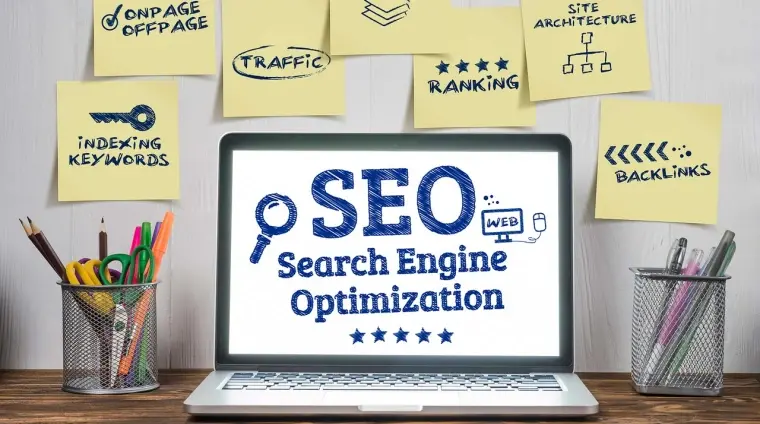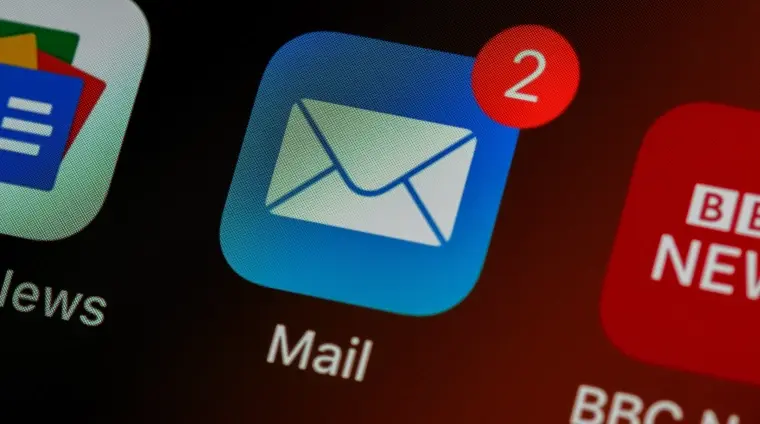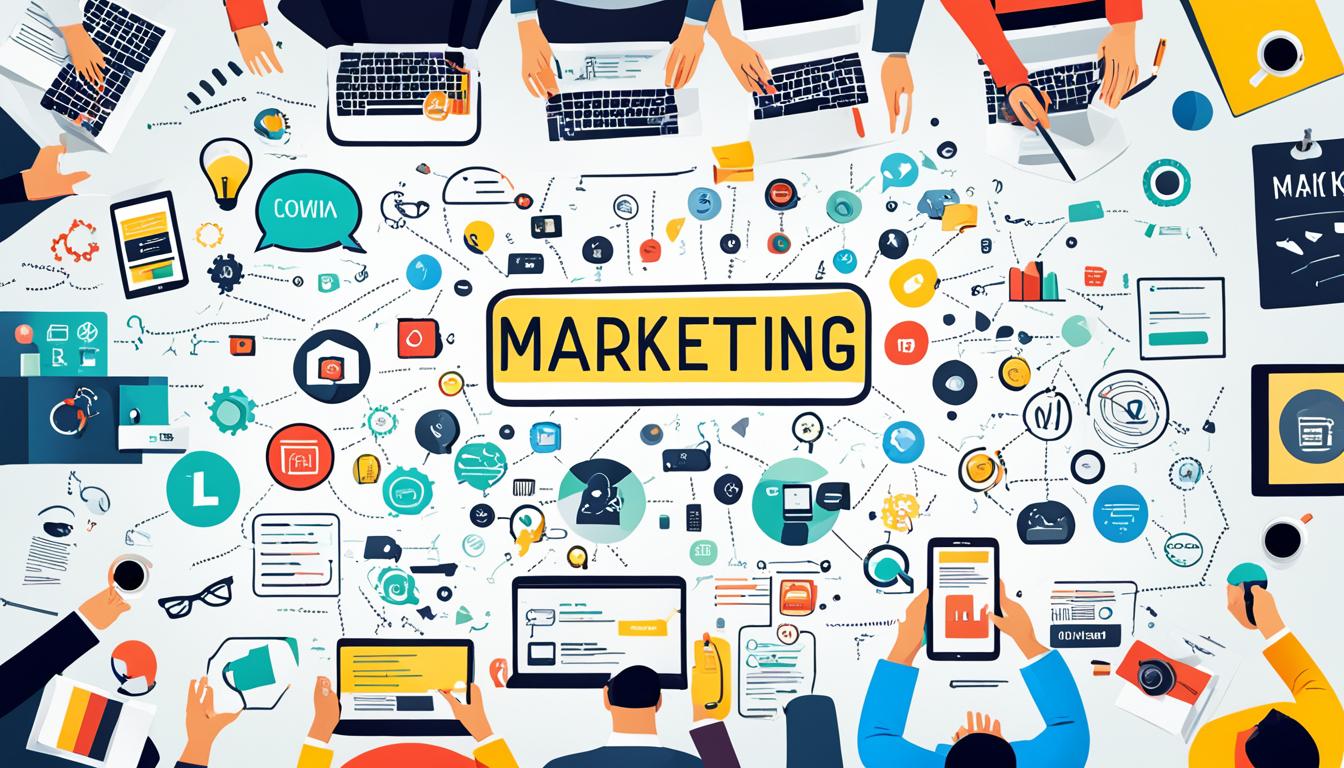Thinking about a career in digital marketing? You might wonder how long it takes to learn the needed skills. The time to learn can differ a lot, depending on your background and how you choose to learn. But, we can give you some basic ideas.
Learning the tools and techniques of digital marketing usually takes one to three months. Want to become an expert? Plan on spending six months to a year or more. This timeframe changes based on how much you want to know and how skilled you want to get.
Looking at ways to start learning? Some people go with self-study. They use online tools, books, and tutorials to learn the basics. Others go for a college degree or take a digital marketing certificate course for more structured learning.
The method you choose to learn digital marketing can also affect the cost. A college degree might be expensive. But, there are cheaper options, like certificate courses. They focus on specific skills and can be more budget-friendly.
Key Takeaways:
- Learning digital marketing can take one to three months for basic proficiency and six months to a year or more for mastery.
- Acquiring digital marketing skills can be done through self-study, a college degree, or enrolling in a digital marketing certificate course.
- The cost of learning digital marketing varies depending on the chosen method, with certificate courses being a more affordable option compared to a four-year college degree.
What is Digital Marketing?
Digital marketing is an online strategy that boosts a product or service’s visibility. It targets specific groups through various online channels. This method allows businesses to see how well their campaigns perform. It’s a way to reach more people and keep track of the results easily.
Businesses use search engines, social media, emails, and websites to connect with people. These tools let them change their marketing quickly. This way, they can show potential customers what they offer when the time is right.
“Digital marketing is all about connecting with the right people, at the right time, with the right message.”
This type of marketing lets companies customize their ads for different groups. By doing this, they spend their money wisely and see better returns. With the help of data, they make ads that really speak to people.
Benefits of Digital Marketing
Digital marketing comes with many advantages for businesses:
- Increased Reach: Businesses can connect with customers worldwide through digital marketing.
- Cost-Effective: It’s often cheaper than traditional methods, allowing companies to save money.
- Real-Time Analytics: Companies can see how their campaigns are doing as they happen.
- Targeted Advertising: They can focus their ads on people who are more likely to buy, improving success rates.
- Improved Customer Engagement: It helps businesses talk to customers more on social media and through emails.
The Role of Digital Marketing in Today’s Business Landscape
Today, people turn to the internet for almost everything. Because of this, digital marketing is key for any successful marketing plan. It helps businesses get noticed, build a stronger brand, and keep customers coming back.
Unlike older methods, digital marketing is easy to target and see results from. This makes it a must-have for companies, no matter their size or industry. With digital marketing, businesses can catch up with changing trends and grow online.
| Benefits of Digital Marketing |
|---|
| Increased Reach |
| Cost-Effective |
| Real-Time Analytics |
| Targeted Advertising |
| Improved Customer Engagement |
What Can You Do with Digital Marketing?
Digital marketing can help businesses in many ways. It lets them do research, build brand loyalty, create a community, and make informed decisions. By using these tactics, companies can increase brand awareness, connect with their audiences, and improve their sales.
Digital marketing is essential for adapting in today’s world. It helps businesses thrive by making meaningful connections with people. As Marc Benioff, CEO of Salesforce, says, “The business of business is relationships; the business of life is human connection.” This technology strengthens connections between businesses and their customers.

Why Digital Marketing Matters
Digital marketing allows businesses to connect with their customers in unique ways. It creates experiences that people remember, driving growth and success. By leveraging technology and data, companies can tailor their marketing to different groups effectively. This flexibility is the key strength of digital marketing.
“The aim of marketing is to know and understand the customer so well the product or service fits them and sells itself.” – Peter F. Drucker
The Role of Research and Analysis
Research and analysis are crucial in digital marketing. They give businesses deep insights into their customers’ needs and behaviors. This information helps companies tailor their marketing to be more effective.
They can see which tactics work best by looking at the data. Then, they make adjustments to improve their marketing campaigns. This ongoing process leads to better, more successful marketing.
Building Brand Loyalty and Community
Loyalty to a brand is key for its long-term success. Digital marketing plays a big part in this. It allows businesses to connect with customers in personal ways. Strategies like personal emails, social media, and loyalty programs make customers feel part of a community around the brand.
Data-Driven Decision Making
Data is very important in digital marketing. By using data, businesses can wisely choose where to focus their efforts. They look at things like website traffic and customer interactions. This data helps them spend their marketing budget where it will be most effective.
Average Time it Takes to Learn Digital Marketing
Learning digital marketing varies based on your method. Normally, it takes one to three months for newbies to get the hang of it. But to become a master, practice and experience for six months to a year is essential. The time can also vary based on your learning background.
Self-study is one common way to learn digital marketing. This method lets you go at your own pace. It’s good because you can focus on what you find interesting. However, it means spending a lot of time studying each week.
Getting a college degree in digital marketing is another path. It takes about four years. This time includes both general education and your major classes. Yet, a degree might not be solely about digital marketing.
Certificate courses offer a shorter route. You can finish them in a matter of weeks to a few months. These courses focus on specific skills like SEO and social media marketing. They give you hands-on practice.
To understand learning times better, let’s compare methods in a table:
| Learning Method | Average Time to Learn |
|---|---|
| Self-Study | 1-3 months |
| College Degree | 4 years |
| Certificate Course | Weeks to months |
Can I Learn Digital Marketing on My Own?
Many people wonder if they can pick up digital marketing by themselves, with no formal training. The good news is, yes, you can! There are tons of resources out there for those ready to explore digital marketing on their own.
These include books, podcasts, and online tutorials. For instance, you can learn about various marketing techniques at your own pace. You don’t need to rush.
“Self-paced learning lets you manage your studies to fit your life. You can choose what and when to learn.”
But, taking a course can speed up your learning. These courses provide a deep dive into digital marketing. They have a guided curriculum and allow for hands-on practice.
A course is great because it lets you learn from the best in the industry. You get to work with others in a similar boat. This makes learning more engaging and practical.
Learning by doing is also key. You should get your hands dirty with real projects. This might be through internships, projects, or freelancing. It helps you apply what you’ve learned in a real-world setting.
Advantages of self-paced learning in digital marketing:
- Work when you want, at your own pace.
- Access a huge variety of educational materials like books and podcasts.
- Focusing on just what you’re interested in is a great plus.
- You can learn in a way that fits your life best.
Advantages of structured digital marketing courses:
- Get a step-by-step learning plan that covers everything you need to know about digital marketing.
- Learn from experienced professionals who act as your guides.
- Try out your skills in practical assignments and workshops.
- Collaborate with others, creating a supportive learning network.
In the end, mixing self-learning, courses, and practical work is the best strategy. It gives you a complete learning experience in digital marketing. Whether you go solo or choose a course, keep yourself updated. This field always has new things happening.
Digital marketing can be a thrilling journey for those who love to learn new things and adapt. So, jump in and start your digital marketing adventure now!

Is it Hard to Learn Digital Marketing?
Learning digital marketing is tough but rewarding. Your background matters a lot. If you studied marketing, you might find it easier. Yet, anyone can get good at digital marketing with hard work.
Digital marketing keeps changing and you must keep learning. Even experts need to update their skills constantly. The industry always has new things like tools and strategies. To succeed, you must stay on top of these changes.
To keep up, you have to keep learning. This is true for both newcomers and experienced pros. You can learn from online courses, workshops, and blogs. Always be ready to learn more to keep up with digital marketing’s changes.
“The only way to stay ahead in the fast-paced and ever-changing world of digital marketing is through continuous learning and adaptation. Embrace the challenge and make learning a lifelong commitment.”
Benefits of Continuous Learning in Digital Marketing
Learning non-stop can make you a better digital marketer. It has many benefits:
- Keeps you updated with the latest trends and technologies
- Enhances your skills and knowledge
- Expands your professional network through attending industry events and engaging with like-minded professionals
- Allows you to stay competitive in the job market and opens up opportunities for career advancement
- Helps you to better understand your target audience and create more effective marketing strategies
If you keep learning, your digital marketing skills will stay sharp. This will help you succeed in the field.
| Pros | Cons |
|---|---|
| Opportunity to acquire new skills and knowledge | Requires time and dedication |
| Keeps you competitive in the job market | Can be overwhelming due to the amount of information available |
| Allows you to adapt to industry changes | Requires staying up-to-date with the latest trends |
In digital marketing, you must always be learning. This is key for your career and personal growth. By learning and facing challenges, you can really succeed in this dynamic field.
Does Learning Have a Start and Finish?
Learning digital marketing is not a one-time thing. It’s an ongoing journey. This journey requires a commitment to always learning and growing. In the field of digital marketing, keeping up with new trends and technologies is vital.
With technology and consumer behaviors always changing, digital marketers need to keep up. This means learning new tools, understanding trends, and mastering analyzing data techniques. Ongoing development in skills is key.
Staying up-to-date with best practices is a must in digital marketing. Know what’s new on platforms like social media, search engines, and online ads. It’s important to use the latest tactics for success.
“In the ever-changing world of digital marketing, ongoing learning is not just an option; it’s a necessity for staying relevant and succeeding in this fast-paced industry.”
Always learning can lead to more professional success. It helps expand skills, try new strategies, and meet industry demands. By focusing on growth, professionals can become experts that others trust.
Benefits of lifelong learning in digital marketing:
- Staying up-to-date with the latest industry trends and technologies
- Gaining a competitive edge in the job market
- Expanding your skill set and expertise
- Driving innovation and creativity in marketing strategies
- Building a strong professional network
- Adapting to changes in consumer behavior and preferences
To wrap up, learning digital marketing is an ongoing process. It needs a constant effort to stay updated and develop. With a lifelong learning mindset, digital marketers can do well in this always-changing field.
Is Digital Marketing a Good Job?
Digital marketing is a popular job that’s full of opportunities. It has seen lots of growth lately. This growth is because many businesses know they need strong digital marketing to reach people online.
Digital marketing can lead to high pay. Companies that want to do better online will pay well to get the right people. So, if you have the right skills, you can earn a good living.
It also lets you work where and when you want. Many jobs in digital marketing can be done from home, which means you can work from any part of the world. This freedom helps a lot of people find a good balance between work and life.
The field is always changing, which keeps it interesting. There are always new things to learn, from new tech to new ways of doing things. This means digital marketers are always growing in their jobs.
“The digital marketing industry is always moving forward. It brings new things to learn and challenges for those in the field. It’s a mix of creativity, numbers, and being able to change, making it a fun place to work.” – Jane Smith, Digital Marketing Manager
In short, digital marketing is a great career with lots of job openings, good pay, the freedom to work from anywhere, and a field that’s always new and exciting. It’s a good career choice, whether you’re just starting out or making a change. So, dive in and see where the digital marketing world can take you.
How Long Does It Take to Learn SEO, PPC, Social Media Marketing, Email Marketing, and Web Analytics?
The time it takes to learn digital marketing skills varies. The timeline depends on your prior knowledge and how you learn. It also depends on how dedicated you are to the subject.
To get good at SEO, it’s about 3-6 months for the basics. You need to understand search engines and how they work, keyword research, and making your site better for search engines. After that, it might take another 6-12 months to handle real SEO projects and understand the data behind them.
With PPC, which is pay-per-click advertising, the essentials take 3-6 months to learn. You’ll learn about keywords, how to write ads, and bid on them. To really master it, you’d need 6-12 more months to run PPC ads and learn advanced targeting.
Social media marketing usually takes 3-6 months to get the basics down. This is making good content, getting people to follow you, and using ads right. If you want to be good at it, then it’d take 6-12 months more to manage different social media accounts and plan out what you post.
For email marketing, you could understand everything in 3-6 months. This is about growing an email list, making emails that people want to open, and checking how well your emails do. But to really stand out, you’d need another 6-12 months to learn about sending the right emails to the right people and making them better by using what you learn from results.
Web analytics helps in making smart marketing choices by looking at your website’s data. Learning the basics of this can take 3-6 months. This involves tracking data and setting up goals. If you want to dive deeper, then 1-2 years could get you there, with learning about A/B tests and what data means for your marketing.
Remember, the time it takes to learn varies. Everyone is different. But, putting in effort and staying interested will help you get good at digital marketing.
Conclusion
Learning digital marketing is a journey that never ends. It requires focus, steady learning, and hands-on practice. How long it takes to become skilled varies. But, with hard work and good tools, you could be proficient in 6-12 months.
Staying current with digital marketing is key for success. This field changes fast, demanding that professionals keep up. Always learning keeps you sharp and competitive in your career.
Investing in digital marketing opens up many opportunities. You can find well-paying jobs and work in jobs that are fun and challenging. Whether you learn on your own or get a formal education, these skills will help you have a satisfying career.
FAQ
How long does it take to learn digital marketing?
It usually takes one to three months to grasp digital marketing basics. But becoming really skilled can take six months to a year.
What is Digital Marketing?
Digital marketing means using the internet to advertise products and services. It’s all about reaching the right people through online means.
What Can You Do with Digital Marketing?
You can use digital marketing for a lot of things in business. Like, learning what customers want, making them more loyal, or sharing ideas online.
It also helps make smart choices to boost a company’s success. This is done by using information about customer habits and needs.
Average Time it Takes to Learn Digital Marketing?
To learn digital marketing, it can take one to three months for beginners. But really getting good can take up to a year of practice and learning.
Can I Learn Digital Marketing on My Own?
Yes, you can learn digital marketing by yourself with the right materials. There are lots of books, podcasts, and online tutorials to help you.
Although, taking courses can speed up your learning and give you a deep understanding.
Is it Hard to Learn Digital Marketing?
How hard digital marketing is to learn changes with each person. People with marketing knowledge may find it easier.
But, hard work and persistence can help anyone become a skilled digital marketer.
Does Learning Have a Start and Finish?
In digital marketing, learning is never really over. You always need to keep up with new trends, tools, and techniques.
Is Digital Marketing a Good Job?
Holding a digital marketing job can be great. There’s a lot of job offers and pay is good. Plus, you can often work from anywhere.
How Long Does It Take to Learn SEO, PPC, Social Media Marketing, Email Marketing, and Web Analytics?
It takes a few months to get the hang of SEO, PPC, social media, emails, and analytics. But, to really manage campaigns and understand the data, it might take a year or less.

















